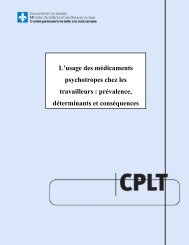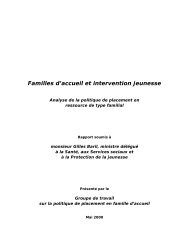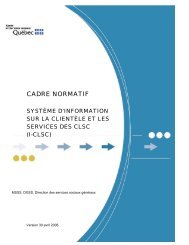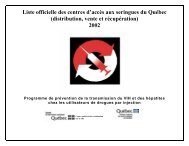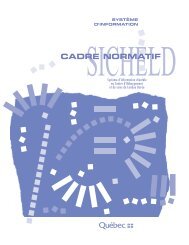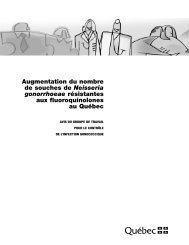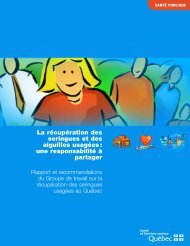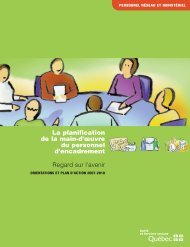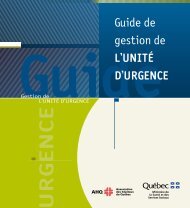De l'innovation au changement - Gouvernement du Québec
De l'innovation au changement - Gouvernement du Québec
De l'innovation au changement - Gouvernement du Québec
You also want an ePaper? Increase the reach of your titles
YUMPU automatically turns print PDFs into web optimized ePapers that Google loves.
5. BILAN DE L’EXPÉRIMENTATION<br />
Projet 19<br />
<strong>De</strong>velopment and Evaluation of Cultural Consultation Service in Mental Health, région de Montréal<br />
Développement et évaluation d'un service de consultation culturelle en santé mentale<br />
The cultural consultant was sometimes placed in a difficult position, called upon to balance the demands of developing an alliance with the<br />
patient based on cultural understanding while still negotiating the rules, norms and standards of traditional psychiatric care. The demands of<br />
these two positions were sometimes in complete opposition.<br />
<strong>De</strong>spite the increased use of professional interpreters in the hospitals, difficulties and resistance to their use was still noted particularly in the<br />
case of hospitals that still tend to rely on staff members to act as interpreters.<br />
Service II : A prospective evaluation of new cases, with longitudinal follow-up. Given the limited <strong>du</strong>ration of the FASS project, the collection of<br />
data for this last component is not complete and will be the subject of later publications.<br />
Some of the obstacles to implementation of the program reflected ambivalence in the broader medical sector (including their respective<br />
hospitals), which at once welcomed the effort to promote transcultural mental health services but simultaneously found it difficult to understand<br />
or appreciate the clinical exigencies or therapeutic models used.<br />
There was pressure to replace the consultation-liaison model with an outpatient treatment team approach to provide additional services that<br />
would simply take some of the load off conventional serves. There was also pressure to respond to emergencies (imminent deportation) or<br />
provide quick consultations when time was needed to bring together the requisite expertise.<br />
Finding resources (consultants, cultural brokers, interpreters, clinicians) of particular cultural backgrounds was sometimes difficult, especially<br />
when the local immigrant community in question was small.<br />
One barrier to addressing these structural problems is the prevalent ethnocentrism of health care providers and planners. For example, many<br />
hospitals under-utilize existing interpreter resources bec<strong>au</strong>se practitioners are satisfied with a minimal level of communication with their<br />
patients, or find it too difficult logistically to obtain the requisite help.<br />
Concerns voiced by clinicians who had not used the service included the impression that such consultations would increase their workload,<br />
were too lengthy, take too long to arrange, and therefore not respond to the need for rapid problem-resolution necessitated by acute<br />
psychiatric treatment.<br />
Funding remained a particularly salient problem. In the Medicare system funding for psychiatrists can be readily arranged but support for other<br />
professionals (i.e. psychologist, nurse-practitioner, social worker, etc.) needed for an interdisciplinary team is less available. The most<br />
pressing needs are for a fulltime clinical coordinator to provide telephone consultation and triage, and funds to compensate the cultural<br />
consultants and culture-brokers drawn from the ethnocultural communities.<br />
Health Impacts & Cost Effectiveness : Due to the extremely heterogeneous nature of the cases, the relatively brief intervention, and the lack<br />
of direct patient contact in many cases, it was not feasible to measure or reasonable to expect direct health impacts on the patients seen by<br />
the service.<br />
5.1 Résultats Service I : Over the 12-month period of formal data collection, the CCS service received 102 requests for consultation.<br />
The most common reasons for consultation were for help with clarifying a diagnosis or the meaning of specific symptoms or behaviours (58%),<br />
treatment planning (45%), and for information or a link to organizations and resources related to a specific ethnocultural group or issue (e.g.<br />
refugee status (25%).<br />
About half of all requests to the CCS could be resolved with telephone contact and informal exchange of information or linking to specific<br />
99





